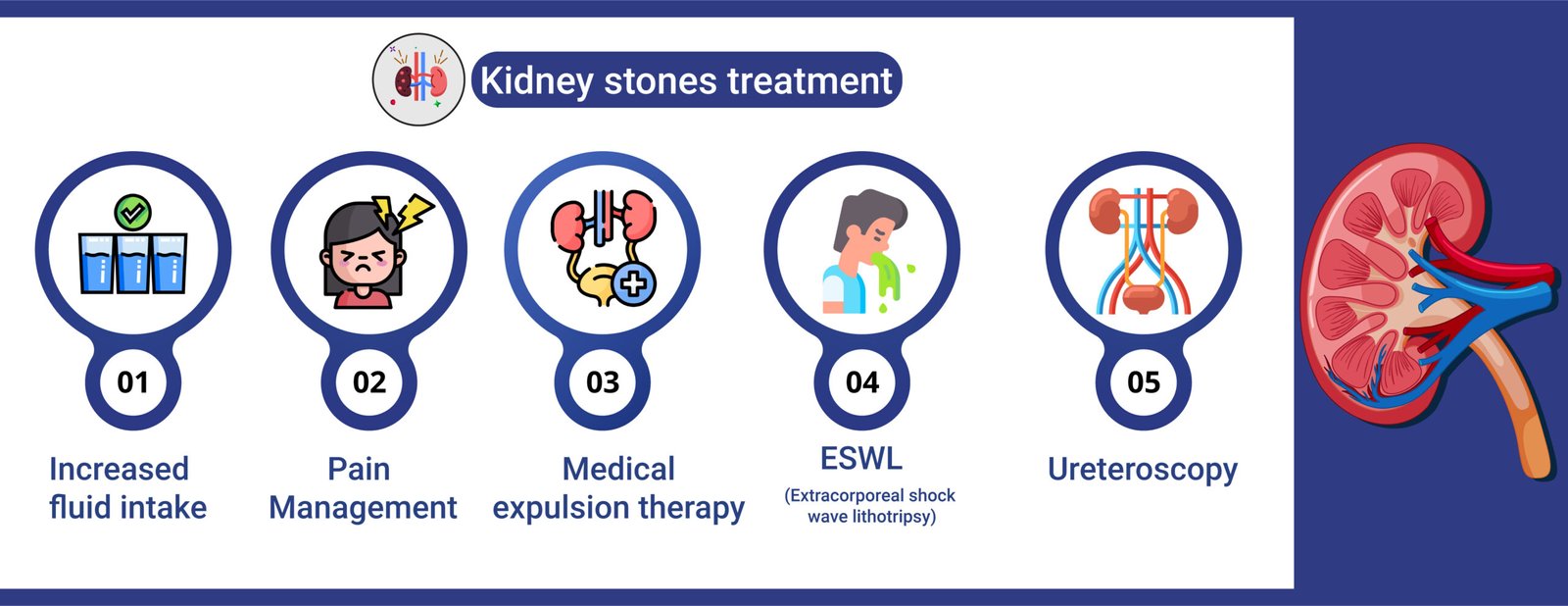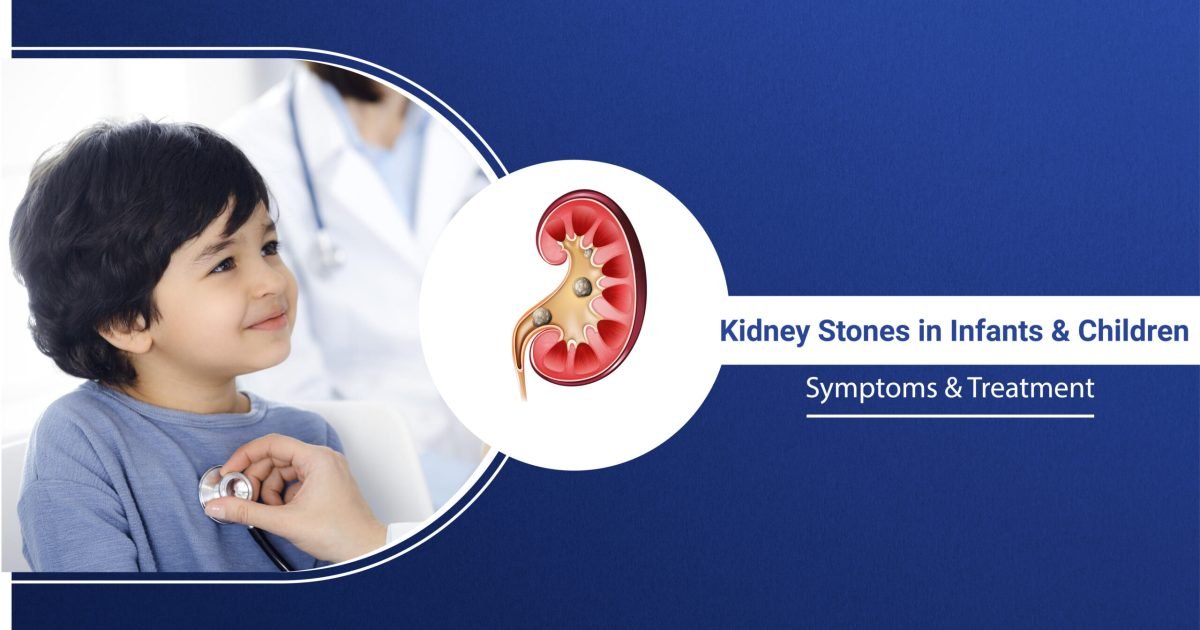In this blog, we will explore the causes, symptoms, and treatment options for this condition. Kidney stones are hard mineral deposits that form in the kidneys and can cause discomfort and pain when passing through the urinary tract. Although more common in adults, children can also develop kidney stones. Some common causes include dehydration, certain medical conditions, and a family history of kidney stones. Symptoms may include severe pain, blood in the urine, and frequent urination. Treatment options include increased fluid intake, medication, and in some cases, surgical intervention. Join us as we delve into this topic and provide valuable insights for parents and caregivers.
What is Meant by Kidney Stone Removal in Children?
Kidney stone removal treatment in children refers to the medical procedures or interventions aimed at eliminating kidney stones from a child’s urinary tract. When a child develops kidney stones, it can cause pain, discomfort, and potential complications. Thus, it becomes necessary to remove the stones to alleviate symptoms and prevent further damage.
The specific method of kidney stone removal depends on the size, location, and composition of the stones, as well as the child’s overall health. In some cases, smaller stones may pass naturally through the urine with increased fluid intake and pain management. However, larger stones or those causing severe symptoms may require medical intervention.
Kidney Stones in Infants and Children
Kidney stones in infants and children are hard mineral deposits that form in the kidneys. These stones can vary in size and can cause discomfort and pain as they travel through the urinary tract Infections. Kidney stones can affect children of all ages, although they are more common in older children. When diagnosed with kidney stones, medical intervention may be necessary to remove the stones and alleviate symptoms. The specific method of removal depends on factors such as the size and location of the stones. Treatment options may include non-invasive procedures such as shock wave lithotripsy or more invasive surgical procedures like ureteroscopy or percutaneous nephrolithotomy.
Kidney Stone Symptoms
Kidney stones in children can cause a range of symptoms that vary in severity. It’s important for parents and caregivers to be aware of these symptoms to seek appropriate medical attention. Here are some common symptoms of kidney stones in children:

- Abdominal or flank pain: Children with kidney stones may experience severe pain in the abdomen or on the side of the body where the affected kidney is located. The pain can be sharp, intermittent, or persistent.
- Hematuria: Blood in the urine is a common symptom of kidney stones. It may cause the urine to appear pink, red, or brown. Sometimes, the presence of blood in the urine can only be detected through a microscopic examination.
- Dysuria: Children with kidney stones may experience pain or discomfort while urinating. They may also have an urgent or frequent need to urinate.
- Nausea and vomiting: The presence of kidney stones can lead to nausea and vomiting in children. These symptoms may be associated with the pain caused by the stones or due to the obstruction in the urinary tract.
- Urinary tract infections (UTIs): Kidney stones can increase the risk of developing UTIs in children. Symptoms of a UTI include frequent urination, pain or burning during urination, cloudy or foul-smelling urine, and fever.
It’s important to note that the symptoms of kidney stones in children can be similar to those of other conditions. Therefore, if your child experiences any of these symptoms, it is crucial to consult a healthcare professional for an accurate diagnosis and appropriate treatment.
Kidney Stones Treatment
The treatment of kidney stones in children aims to alleviate symptoms, remove the stones, and prevent complications. The specific treatment approach depends on factors such as the size, location, and composition of the stones, as well as the child’s overall health. Here are common treatment options for kidney stones in children:

- Increased fluid intake: Encouraging the child to drink plenty of fluids, especially water, helps in flushing out the stones and preventing further stone formation. This approach is particularly effective for small stones that can pass naturally.
- Pain management: Medications may be prescribed to manage pain and discomfort associated with kidney stones. Over-the-counter pain relievers or stronger prescription medications may be used, depending on the child’s age and the severity of the pain.
- Medical expulsion therapy: In some cases, medications like alpha blockers may be prescribed to relax the muscles in the urinary tract, making it easier for the stones to pass.
- Extracorporeal shock wave lithotripsy (ESWL): This non-invasive procedure uses shock waves to break down the stones into smaller pieces, which can then pass through the urine.
- Ureteroscopy: A thin tube with a camera is inserted into the urethra and guided to the stone’s location.
- Percutaneous nephrolithotomy (PCNL): This surgical procedure involves making a small incision in the child’s back to access the kidney and remove the stone directly. It is typically used for larger or more complex stones.
The choice of treatment depends on several factors, and the child’s pediatric urologist will determine the most appropriate approach. Regular follow-up visits may be required to monitor the child’s condition and prevent recurrence of kidney stones.
Types of Kidney Stones in Children
In children, kidney stones can form due to various factors, and the composition of the stones can vary. Here are the different types of kidney stones commonly found in children:

- Calcium stones: These are the most common type of kidney stones in children. They are primarily composed of calcium oxalate or calcium phosphate. Excessive amounts of calcium or oxalate in the urine can lead to the formation of these stones. Factors like dietary habits, certain medical conditions, and genetic predisposition can contribute to calcium stone formation.
- Struvite stones: Struvite stones, also known as infection stones, are often associated with urinary tract infections (UTIs). They are composed of magnesium ammonium phosphate. UTIs can cause the urine to become more alkaline, promoting the formation of struvite stones.
- Uric acid stones: Uric acid stones form due to high levels of uric acid in the urine. They can occur in children who have a diet high in purines or those with certain metabolic disorders. Uric acid stones are more common in older children and adolescents.
- Cystine stones: Cystine stones are relatively rare and are caused by a hereditary condition called cystinuria. Children with cystinuria have difficulty reabsorbing cystine, an amino acid, in the kidneys. As a result, cystine accumulates in the urine and can form stones.
It’s important to note that some kidney stones in children may be composed of a combination of different minerals. The identification of the stone composition is essential for determining appropriate treatment and preventive measures. Healthcare professionals can perform tests, such as urine analysis and stone analysis, to identify the specific type of stone and guide treatment decisions accordingly.
Conclusion
Kidney stones can occur in infants and children, causing discomfort and potential complications. Recognizing the causes, such as dehydration, certain medical conditions, and family history, is crucial for prevention. Prompt identification of symptoms like abdominal pain, blood in the urine, and dysuria helps in early intervention. Treatment options, including increased fluid intake, pain management, and various procedures like ESWL or ureteroscopy, aim to alleviate symptoms and remove the stones. Dr. Saket Narnoli, a renowned pediatric urologist, can provide expert guidance and personalized care for children with kidney stones, ensuring their well-being and long-term health. Remember, timely diagnosis and appropriate treatment are key to managing kidney stones in infants and children effectively.






